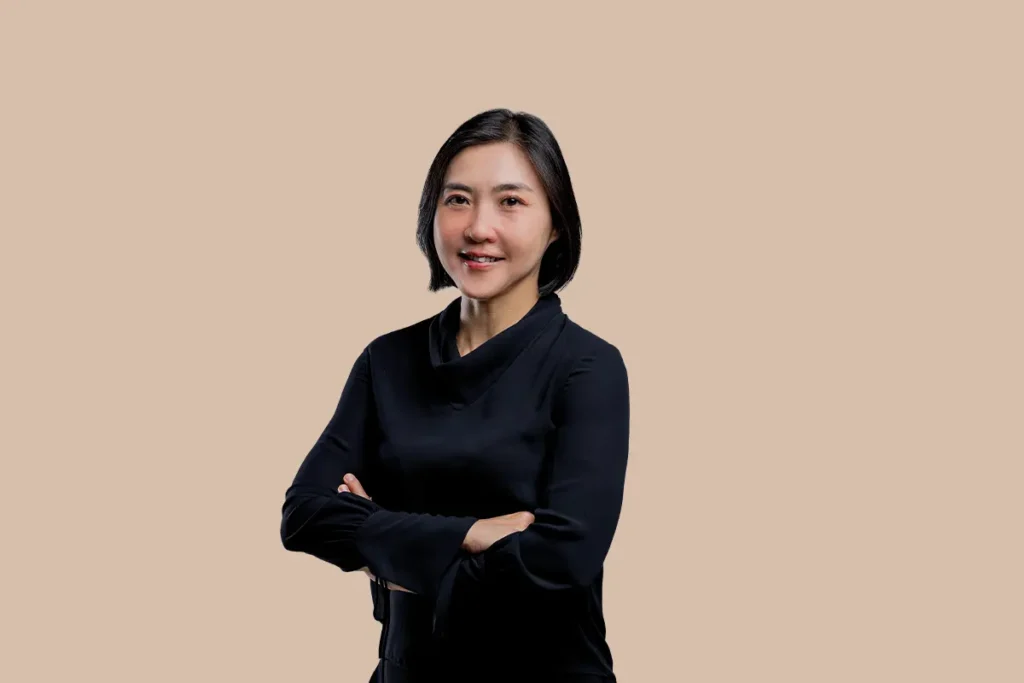

A Leader That Puts Purpose Over Profit
Director
Matrix Ingredients


A Leader That Puts Purpose Over Profit
Director
Matrix Ingredients
Nearly half of the global workforce today is made up of women, representing more than 2.4 billion individuals who help drive the world’s economy forward. This marks tremendous progress while also underscoring the invaluable qualities women bring to leadership roles, from managing high-performing teams to driving strategic projects. One remarkable leader who has broken through every barrier in the traditionally unstructured and male-dominated processed meat industry is Moy Teo, Director of Matrix Ingredients who has been recognised among women leaders to watch in 2025.
With close to 25 years of experience, she has carved out her place in a sector where, as she points out, almost 95 percent of senior decision-makers and workers are men. Her journey has been shaped by a determination to keep learning and evolving, even as the industry shifts at an ever-faster pace. She takes pride in having built a resilient and profitable business model that can withstand market swings and changing consumer tastes. She believes that building a valuable and profit-driven business has been one of her proudest professional milestones.
Over the years, Moy Teo has developed a leadership approach that balances empathy, intuition, and collaboration with clear, results-oriented decision-making. Beyond her own growth, she has committed to mentoring a second-generation team that can carry her vision into the future. She believes leaders succeed when they first understand themselves and build authentic, emotionally intelligent relationships with their teams.
Looking ahead, she is focusing on empowering the next generation of leaders while preparing her business to capitalize on the benefits of emerging technologies, such as AI and automation. She believes that while technology will transform many aspects of the food supply chain, the human connection around food culture will always remain irreplaceable.
In this exclusive conversation with CEO Outlook Global for Women Leaders to Watch in 2025, Moy Teo shares candid insights into her remarkable journey, the challenges she faced, the lessons that have shaped her, and her hard-won guidance for aspiring women leaders committed to building sustainable, purpose-driven growth for themselves and future generations.
I’ve spent close to 25 years in the processed meat industry — a space that’s far more dynamic than many realize. Even after all these years, I’m still learning something new every single day, which keeps me motivated and sharp. One of my proudest milestones is building a business model that stays profitable, sustainable, and growth-focused despite trends that can disappear almost overnight. In an industry where change is the only constant, being able to adapt while maintaining strong fundamentals has been the real triumph.
I am a firm believer that emotional intelligence (EQ) often outweighs IQ. Any human being with a reasonable IQ and even the slightest willingness to learn can acquire knowledge over time. However, soft skills such as problem-solving, critical thinking, flexibility, adaptability, communication, and perseverance are the real differentiators. These interpersonal skills are what makes someone a truly strong team player, and I consider them essential when shortlisting candidates.
The importance of these skills may vary depending on a person’s role, but in the agency and distribution business, emotional skills are absolutely vital. People must be able to communicate effectively with diverse individuals, collaborate seamlessly, and solve even the most complex challenges around tight timelines and deliveries.
Equally important are attitude and character. The person I choose to groom and train must, above all, be hardworking, open to learning, and guided by strong moral principles. Skills can be developed — but these foundational qualities are non-negotiable.
I have never believed in get-rich-quick schemes, and that conviction has strengthened my belief in the power of passive income. My own wealth-building strategy has always been rooted in a very simple concept: compounding. I encourage young people to start investing as early as possible, with whatever small amount they can spare. If they can, saving at least 50% of their income and keeping six months’ worth of expenses in a fixed account to generate stable interest is a great first step. That financial cushion can then be used to invest in upskilling, education, or personal goals, such as travel or creative pursuits.
Personally, I’m a keen property investor. Over the past 25 years, I’ve been disciplined enough to build at least one fixed investment per year, buying one or two properties annually. My approach is also very straightforward: I take as few loans as possible, paying down mortgages aggressively through other investment channels until the asset is completely debt-free.
If I could give young women just two pieces of advice, it would be this:
Letting go of a business I’d poured 20 years of my life into was one of the hardest calls I’ve ever made. Looking back, the biggest lesson is that bigger isn’t always better. Once the company became part of a listed group, it naturally transitioned into a more corporate entity, and some of the personal connections that had been the heart of what made it special began to fade.
In a niche industry like processed meat, where trust and relationships are everything, that human touch matters more than scale. At the end of the day, growth only makes sense if you continue to add value and look after your customers. The rest will follow.
Discipline, perseverance, and daily self-reflection are non-negotiable. Track your day, learn from your mistakes, and commit to small improvements — that is the foundation of financial freedom.
Leadership is never one-size-fits-all, and its definition continues to evolve. Broadly speaking, women leaders are often seen as collaborative, nurturing, intuitive, and protective — bringing a relationship-oriented style to the table. In contrast, men’s leadership is traditionally viewed as more assertive and results-driven. But these are just tendencies, not absolutes. We must resist stereotypes and focus instead on a results-oriented mindset that draws from self-awareness. Leaders who lack self-awareness often struggle with emotional intelligence, making it harder for them to connect with their teams.
Ultimately, the most effective leaders — regardless of gender — share certain traits: confidence, clarity in communication, foresight, competence, and the ability to unite people behind a common goal. In the processed meat industry, which remains overwhelmingly male-dominated, I’ve seen my own leadership evolve over 25 years. That journey has taught me to blend traditionally “male” and “female” leadership qualities, creating a unique style that has helped me thrive in a highly competitive arena.
One of the most demanding aspects of my role today is ensuring a strong succession plan. After more than 25 years in the industry and now in my fifties, I see the biggest challenge as finding the right person to carry forward the legacy I’ve worked so hard to build. I’ve recently put together what I call my “second-generation team,” and I’m in the process of passing on my knowledge and skills so they can, in my words, “take over my baton and keep this legacy alive for years to come.” It’s a challenge but also a responsibility I take deeply to heart.
As a Buddhist, I often anchor myself to a simple yet profound truth: “This too shall pass.” Nothing in life is permanent, whether it’s joy or hardship. So when setbacks hit, I remind myself it’s just a passing storm, and the sun will eventually shine again.
I try to see challenges as life’s way of keeping me on my toes. If one door closes, another will open — that’s always been my guiding belief. Life will throw you curveballs, but how you choose to swing is entirely up to you.
There’s a beautiful quote by Albert Einstein that I hold close to my heart: “Failure is success in progress.” It reminds me that people who never fail often never try, and that’s the real loss.
Even now, I start each morning with gratitude, thinking of those who have far less than I do yet still persevere. That perspective humbles me and strengthens my resolve: if they refuse to give up, why should I?
You know, I’ve never measured success by the size of my bank account. For me, it has always been about fulfillment — enjoying what I do, living simply, and staying true to my values. Money is just a non-living thing; it can never share your emotions or fill your heart.
Even after 25 years, not much has changed for me. I still love cooking homemade meals for my family, just like I did in the early days, and that simple joy keeps me grounded.
If you’ve built your life from scratch, you learn how to survive and rebuild if things go wrong. But someone born into comfort may struggle to bounce back when everything falls apart. That resilience, I believe, is the true definition of success.
Never miss any important news. Subscribe to our newsletter.
Copyright 2025 CEO Outlook Global. All rights reserved.